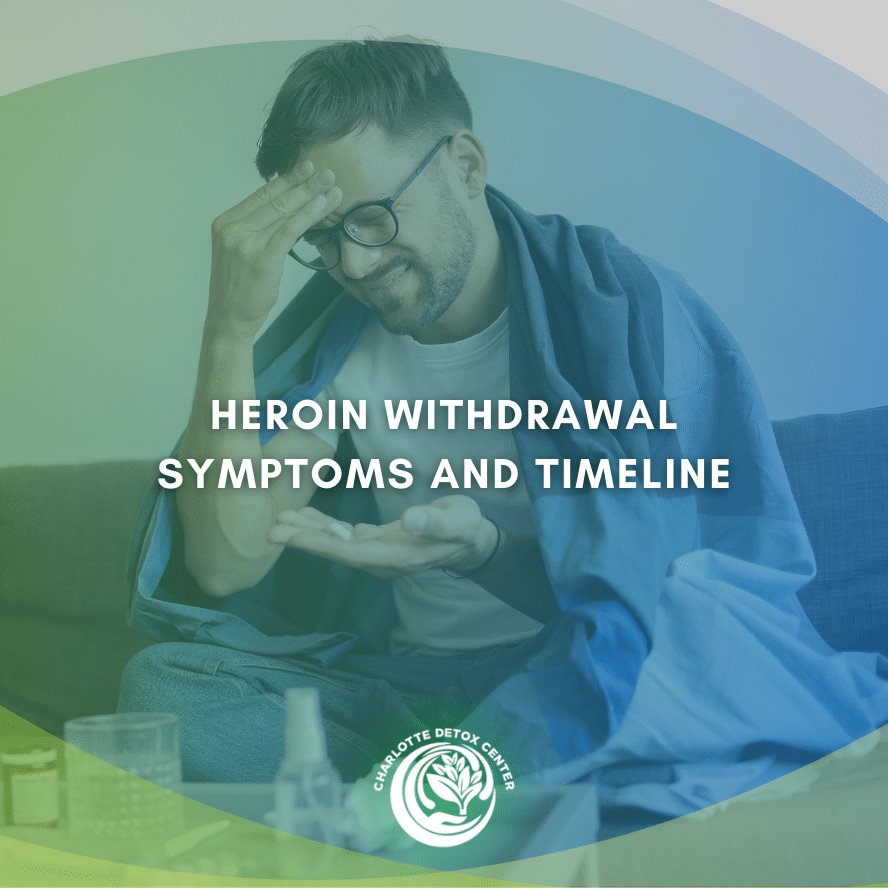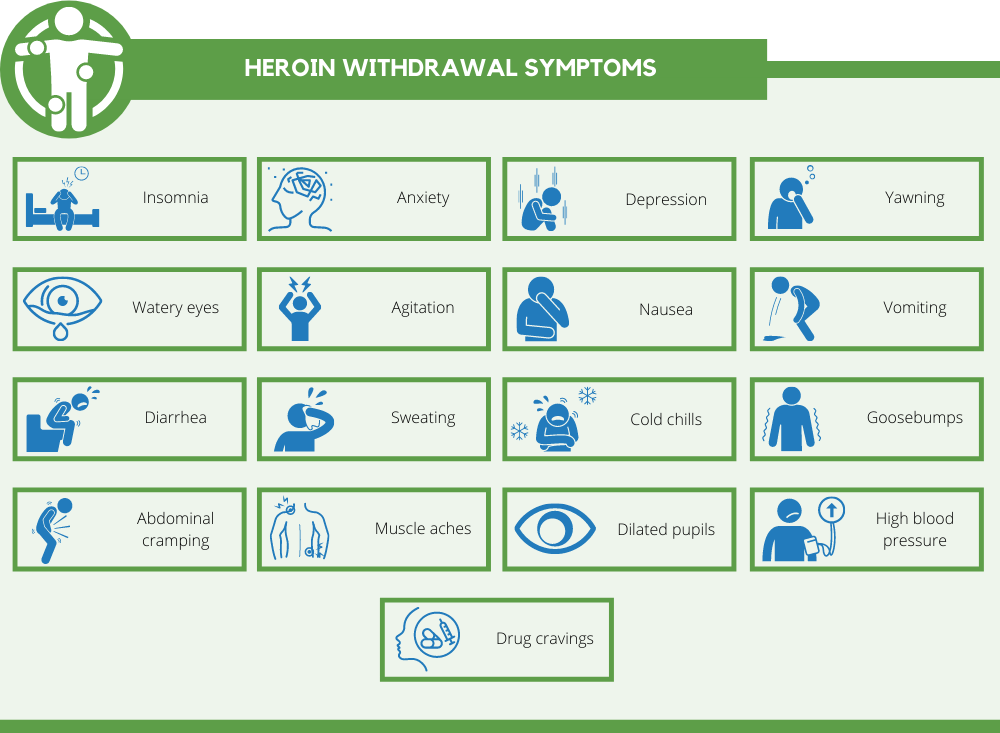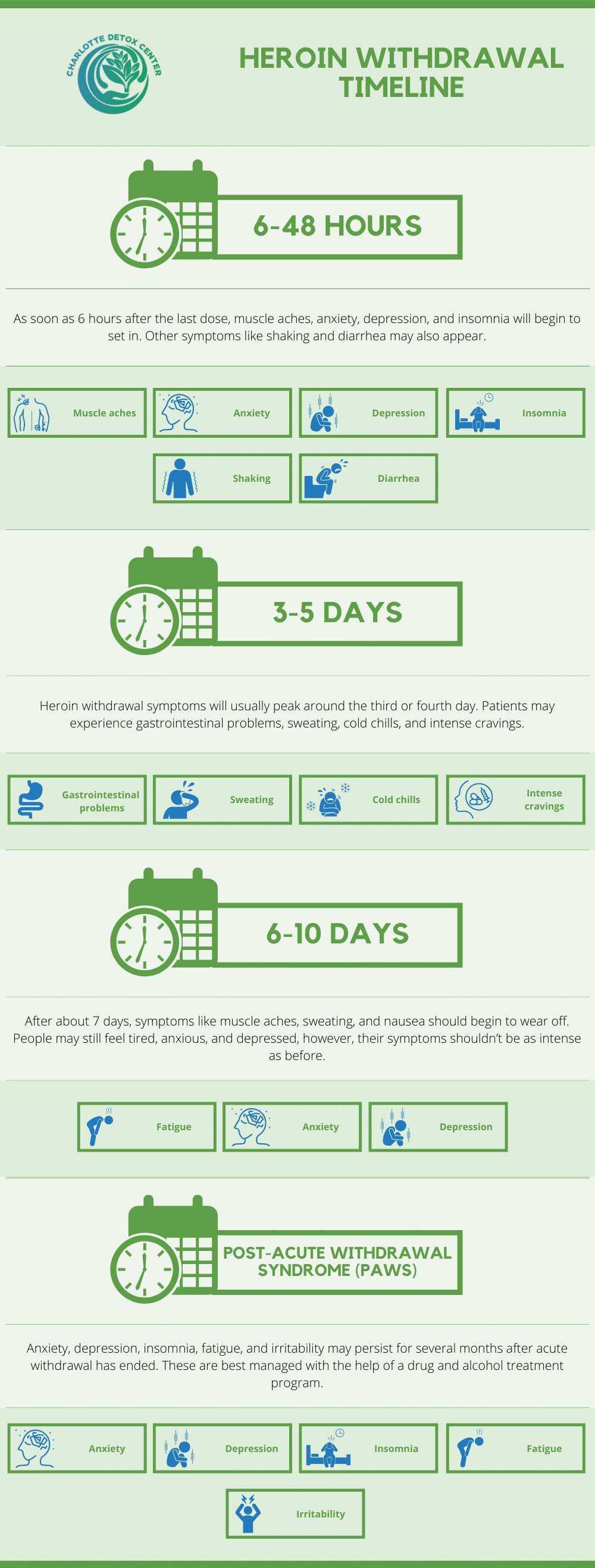Heroin Withdrawal Symptoms and Timeline

Medically Verified: 2/1/24
Medical Reviewer
Chief Editor

All of the information on this page has been reviewed and verified by a certified addiction professional.
Heroin is an illicit opioid drug that has a high potential for abuse and addiction. Like other opioids, heroin can be habit-forming in as little as one week. Repeated heroin use changes the way the brain responds to pain and pleasure, and it keeps people coming back for more. Some individuals are thought to become addicted to heroin after just a couple of doses. Unfortunately, once addicted, it can be extremely difficult to stop. Users may experience painful heroin withdrawal symptoms that seem to last for days with little relief. Fortunately, symptoms can be managed safely and effectively at a drug detox center in Charlotte, North Carolina.
What Causes Heroin Withdrawal?
Heroin is a central nervous system (CNS) depressant that, when abused, acts in a similar way as other opioids and is highly addictive. The drug directly impacts the reward system in the brain, causing users to feel as though they need to take increasing doses of it. Then, when these individuals stop using after several days, weeks, or months of using heroin, they experience withdrawal symptoms.
Withdrawal symptoms occur when the body is in an overactive state as it attempts to adjust to functioning without heroin in the body. These symptoms often mimic a severe case of the flu and, although usually not deadly, are uncomfortable enough to convince people who are addicted to heroin to continue using the drug.
Heroin Withdrawal Symptoms
Symptoms of withdrawal can set in as soon as 4-6 hours after a person stops using heroin. Other more mild or moderate users may not begin experiencing symptoms for 12 hours. Heroin withdrawal resembles a case of the flu, involving symptoms such as:[1]

- Insomnia
- Anxiety
- Depression
- Yawning
- Watery eyes
- Agitation
- Nausea
- Vomiting
- Diarrhea
- Sweating
- Cold chills
- Goosebumps
- Abdominal cramping
- Muscle aches
- Dilated pupils
- High blood pressure
- Drug cravings
Both the physical and psychological symptoms of withdrawal are best dealt with at a heroin detox center.
Factors That Affect How Long Heroin Withdrawal Lasts
Everyone experiences heroin addiction and detox differently. How severe symptoms become and how long they last depend on a variety of factors that can vary from one person to the next.
- The extent of the person’s addiction – People who use heroin more frequently, in higher doses, and for longer periods of time are more prone to severe and long-lasting withdrawal symptoms. The method of administration (snorting, shooting, smoking, etc) can affect this as well.
- Metabolic rate – People with a faster metabolism will process and excrete heroin from the body more quickly. As a result, older people, those who are overweight, or have health conditions that affect their metabolism may experience more severe withdrawal symptoms.
- Underlying health conditions – The presence of underlying health conditions, such as depression or bipolar disorder, can impact the withdrawal timeline. They can also worsen certain psychological symptoms.
Overall, most people notice their symptoms have mostly subsided after one week. However, post-acute withdrawal syndrome (PAWS) is a condition that is fairly common with heroin abuse. As a result, some individuals will experience prolonged symptoms of depression, cravings, and general discomfort for up to one month after stopping the use of heroin.
Heroin Withdrawal Timeline

While the exact withdrawal timeline will vary from one person to the next, here is a general guide of what to expect during heroin withdrawal.[2]
- 6-48 hours – as soon as 6 hours after the last dose, muscle aches, anxiety, depression, and insomnia will begin to set in. Other symptoms like shaking and diarrhea may also appear.
- 3-5 days – heroin withdrawal symptoms will usually peak around the third or fourth day. Patients may experience gastrointestinal problems, sweating, cold chills, and intense cravings.
- 6-10 days – after about 7 days, symptoms like muscle aches, sweating, and nausea should begin to wear off. People may still feel tired, anxious, and depressed, however, their symptoms shouldn’t be as intense as before.
- Post-acute withdrawal syndrome (PAWS) – anxiety, depression, insomnia, fatigue, and irritability may persist for several months after acute withdrawal has ended. These are best managed with the help of a drug and alcohol treatment program.
Heroin Detox in Charlotte, North Carolina
Heroin detox centers in Charlotte can provide a safe and medically supervised place for patients to undergo withdrawal. While heroin withdrawal is typically not considered life-threatening, complications such as dehydration or relapse are always a possibility. As a result, it is in the best interest of all individuals to detox at a medical facility.
Supervised medical detox is always the recommended route to treating heroin dependence. Doctors and nursing staff are able to monitor symptoms, prescribe medications, and prevent relapse during this difficult phase of recovery. Using medications like Suboxone and Methadone, patients can successfully and comfortably get through the withdrawal process.
Withdrawal symptoms can make quitting heroin a dreadful task, but beating addiction is more than possible with the help at Charlotte Detox Center. To take the first step towards recovery, contact us today.
References:
